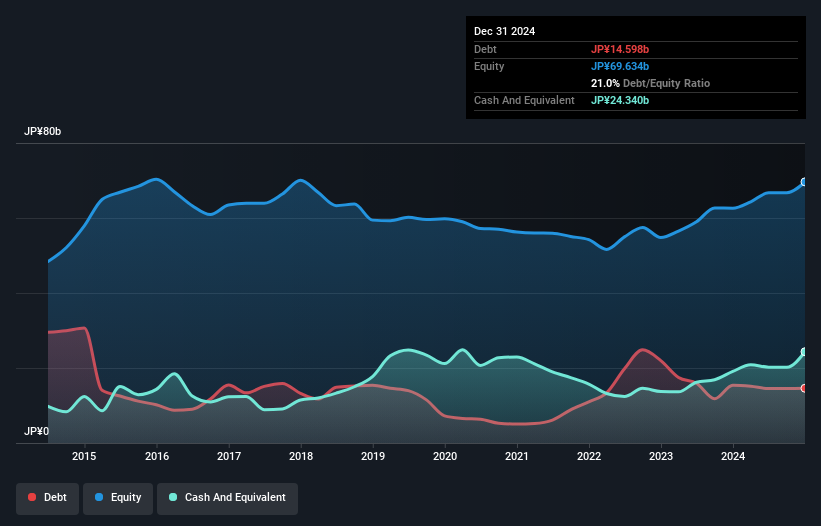
Some say volatility, rather than debt, is the best way to think about risk as an investor, but Warren Buffett famously said that 'Volatility is far from synonymous with risk.' So it might be obvious that you need to consider debt, when you think about how risky any given stock is, because too much debt can sink a company. Importantly, Foster Electric Company, Limited (TSE:6794) does carry debt. But the real question is whether this debt is making the company risky.
Our free stock report includes 2 warning signs investors should be aware of before investing in Foster Electric Company. Read for free now.What Risk Does Debt Bring?
Debt assists a business until the business has trouble paying it off, either with new capital or with free cash flow. Ultimately, if the company can't fulfill its legal obligations to repay debt, shareholders could walk away with nothing. However, a more frequent (but still costly) occurrence is where a company must issue shares at bargain-basement prices, permanently diluting shareholders, just to shore up its balance sheet. By replacing dilution, though, debt can be an extremely good tool for businesses that need capital to invest in growth at high rates of return. The first step when considering a company's debt levels is to consider its cash and debt together.
What Is Foster Electric Company's Debt?
The image below, which you can click on for greater detail, shows that Foster Electric Company had debt of JP¥14.6b at the end of December 2024, a reduction from JP¥15.4b over a year. But on the other hand it also has JP¥24.3b in cash, leading to a JP¥9.74b net cash position.

A Look At Foster Electric Company's Liabilities
Zooming in on the latest balance sheet data, we can see that Foster Electric Company had liabilities of JP¥37.8b due within 12 months and liabilities of JP¥5.90b due beyond that. Offsetting this, it had JP¥24.3b in cash and JP¥32.5b in receivables that were due within 12 months. So it actually has JP¥13.1b more liquid assets than total liabilities.
This surplus strongly suggests that Foster Electric Company has a rock-solid balance sheet (and the debt is of no concern whatsoever). With this in mind one could posit that its balance sheet means the company is able to handle some adversity. Succinctly put, Foster Electric Company boasts net cash, so it's fair to say it does not have a heavy debt load!
View our latest analysis for Foster Electric Company
And we also note warmly that Foster Electric Company grew its EBIT by 11% last year, making its debt load easier to handle. When analysing debt levels, the balance sheet is the obvious place to start. But it is future earnings, more than anything, that will determine Foster Electric Company's ability to maintain a healthy balance sheet going forward. So if you want to see what the professionals think, you might find this free report on analyst profit forecasts to be interesting.
Finally, a business needs free cash flow to pay off debt; accounting profits just don't cut it. Foster Electric Company may have net cash on the balance sheet, but it is still interesting to look at how well the business converts its earnings before interest and tax (EBIT) to free cash flow, because that will influence both its need for, and its capacity to manage debt. Happily for any shareholders, Foster Electric Company actually produced more free cash flow than EBIT over the last two years. That sort of strong cash generation warms our hearts like a puppy in a bumblebee suit.
Summing Up
While we empathize with investors who find debt concerning, you should keep in mind that Foster Electric Company has net cash of JP¥9.74b, as well as more liquid assets than liabilities. The cherry on top was that in converted 169% of that EBIT to free cash flow, bringing in JP¥7.6b. So is Foster Electric Company's debt a risk? It doesn't seem so to us. The balance sheet is clearly the area to focus on when you are analysing debt. But ultimately, every company can contain risks that exist outside of the balance sheet. For example, we've discovered 2 warning signs for Foster Electric Company that you should be aware of before investing here.
If you're interested in investing in businesses that can grow profits without the burden of debt, then check out this free list of growing businesses that have net cash on the balance sheet.
New: AI Stock Screener & Alerts
Our new AI Stock Screener scans the market every day to uncover opportunities.
• Dividend Powerhouses (3%+ Yield)
• Undervalued Small Caps with Insider Buying
• High growth Tech and AI Companies
Or build your own from over 50 metrics.
Have feedback on this article? Concerned about the content? Get in touch with us directly. Alternatively, email editorial-team (at) simplywallst.com.
This article by Simply Wall St is general in nature. We provide commentary based on historical data and analyst forecasts only using an unbiased methodology and our articles are not intended to be financial advice. It does not constitute a recommendation to buy or sell any stock, and does not take account of your objectives, or your financial situation. We aim to bring you long-term focused analysis driven by fundamental data. Note that our analysis may not factor in the latest price-sensitive company announcements or qualitative material. Simply Wall St has no position in any stocks mentioned.
About TSE:6794
Foster Electric Company
Engages in the production and sale of loudspeakers, audio equipment, and electronical equipment in Japan and internationally.
Undervalued with excellent balance sheet and pays a dividend.
Market Insights
Community Narratives




